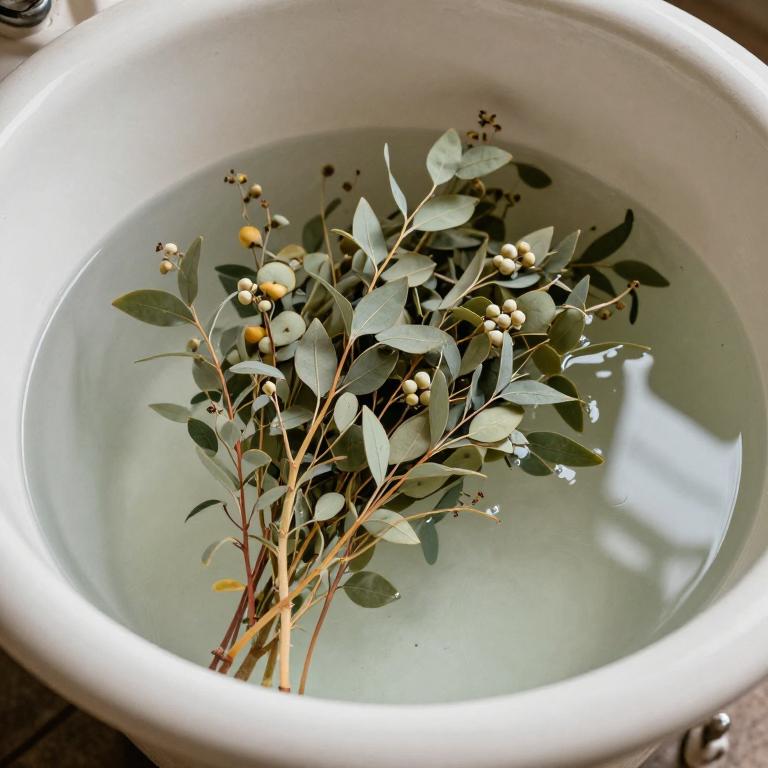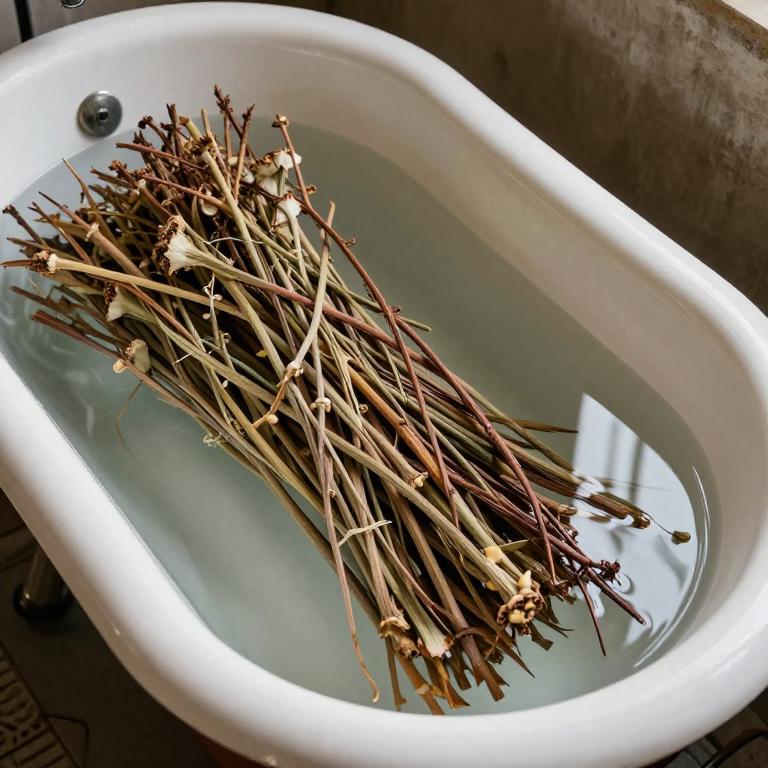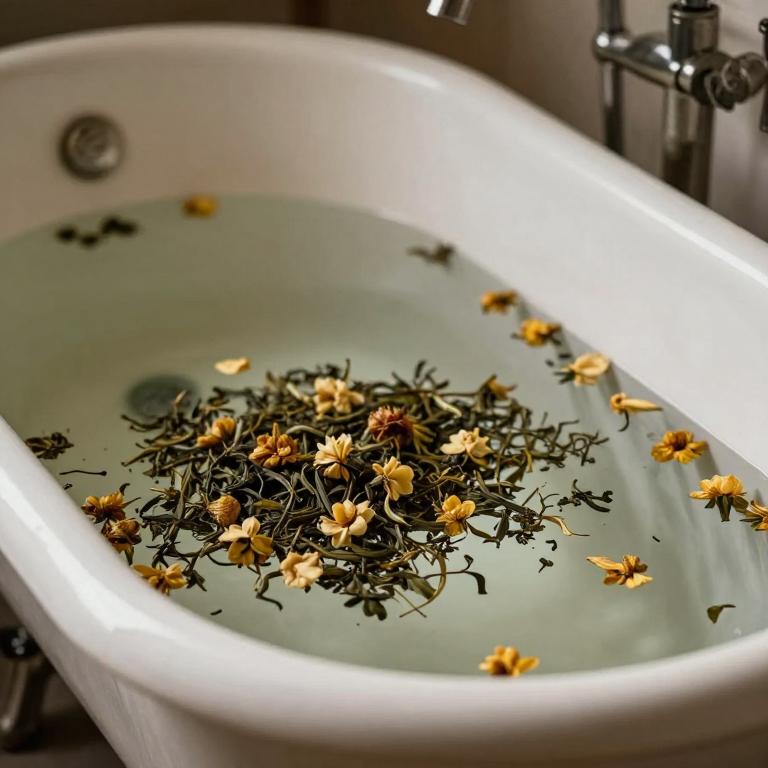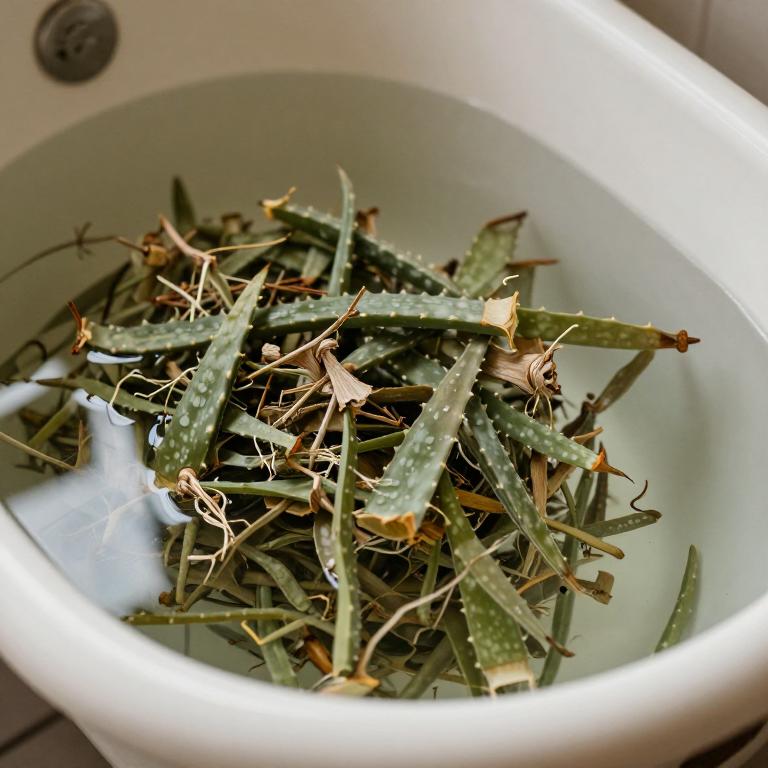10 Best Herbal Baths For Dry Scalp

Herbal baths for a dry scalp involve soaking the head in a warm water solution infused with natural herbs known for their soothing and moisturizing properties.
Common herbs used include lavender, chamomile, rosemary, and peppermint, which help to nourish the scalp and promote healthy hair growth. These herbal infusions can help reduce inflammation, soothe itching, and restore moisture to a dry, irritated scalp. To prepare the bath, simply steep the herbs in hot water and let the solution cool slightly before applying it to the scalp.
Regular use of herbal baths can provide a natural and effective way to alleviate dryness and improve overall scalp health.
Table of Contents
- 1. Rosemary (Rosmarinus officinalis)
- 2. Field horsetail (Equisetum arvense)
- 3. St. john's wort (Hypericum perforatum)
- 4. Stinging nettle (Urtica dioica)
- 5. Salvia (Salvia officinalis)
- 6. Melaleuca (Melaleuca alternifolia)
- 7. English lavender (Lavandula angustifolia)
- 8. Lemon grass (Cymbopogon citratus)
- 9. Camellia (Camellia sinensis)
- 10. Aloe vera (Aloe barbadensis)
1. Rosemary (Rosmarinus officinalis)

Rosmarinus officinalis, commonly known as rosemary, is a fragrant herb that has been traditionally used for its therapeutic properties, including its ability to soothe and rejuvenate the scalp.
When used in herbal baths for a dry scalp, rosemary can help stimulate blood circulation, which may promote healthier hair growth and reduce flakiness. Its essential oils contain compounds like camphor and cineole, which have antimicrobial and anti-inflammatory effects that can help alleviate scalp irritation. To use rosemary in a bath, one can infuse dried rosemary leaves in hot water and let it steep before adding it to a warm bath for soaking.
This natural remedy offers a calming and aromatic way to nourish the scalp and improve overall scalp health.
2. Field horsetail (Equisetum arvense)

Equisetum arvense, commonly known as horsetail, is a herb rich in silica and other minerals that can be used to create beneficial herbal baths for a dry scalp.
When infused into water, horsetail helps to nourish and strengthen the scalp, improving its overall health and hydration. The high silica content in horsetail promotes hair growth and can reduce dandruff by balancing the scalp's moisture levels. To use it for a dry scalp, you can steep fresh or dried horsetail in hot water for several hours, then use the liquid as a rinse after shampooing.
This natural remedy offers a gentle, soothing alternative to commercial treatments, making it a valuable addition to a holistic hair care routine.
3. St. john's wort (Hypericum perforatum)

Hypericum perforatum, commonly known as St. John's Wort, has been traditionally used in herbal baths to soothe and nourish the scalp, particularly for those experiencing dryness or irritation.
When infused into bath water, the plant's essential oils and antioxidants can help moisturize the scalp and reduce inflammation, promoting a healthier environment for hair growth. The mild antifungal and antimicrobial properties of St. John's Wort may also help prevent scalp infections that can exacerbate dryness. To prepare a hypericum perforatum herbal bath, steep a handful of dried plant material in hot water for several hours, then add the infusion to a warm bath and soak for 15 to 20 minutes.
While generally safe for most people, individuals taking medications should consult with a healthcare provider before using St. John's Wort due to its potential interactions.
4. Stinging nettle (Urtica dioica)

Urtica dioica, commonly known as stinging nettle, can be used in herbal baths to soothe and nourish a dry scalp.
To prepare the bath, fresh or dried nettle leaves are steeped in hot water to create a potent infusion, which is then used as a rinse for the scalp. The anti-inflammatory and antioxidant properties of nettle help to reduce irritation and promote healthy hair growth. Regular use of a nettle bath can help moisturize the scalp, alleviate dryness, and reduce dandruff.
However, it is important to ensure that the infusion is not too strong to avoid skin irritation.
5. Salvia (Salvia officinalis)

Salvia officinalis, commonly known as sage, has been traditionally used in herbal baths to address dry scalp issues due to its soothing and antifungal properties.
When infused into bath water, sage can help to gently exfoliate dead skin cells and reduce flakiness, promoting a healthier scalp environment. The anti-inflammatory compounds in sage may also help alleviate irritation and redness associated with dryness or dandruff. To prepare a sage bath, simply steep a handful of dried sage leaves in hot water for 15-20 minutes, then add the strained infusion to a warm bath and soak for 15-20 minutes.
Regular use of sage herbal baths can provide a natural, calming remedy for those seeking relief from dry scalp discomfort.
6. Melaleuca (Melaleuca alternifolia)

Melaleuca alternifolia, commonly known as tea tree oil, is a natural remedy often used in herbal baths to address dry scalp issues.
When diluted properly in warm water, it can help soothe irritation and reduce flakiness by its antimicrobial and anti-inflammatory properties. Adding a few drops of tea tree oil to a bath can provide a calming effect while moisturizing the scalp and promoting healthier hair growth. This method is particularly beneficial for those with sensitive skin or who prefer natural treatments over chemical-laden products.
Regular use of melaleuca alternifolia in herbal baths may improve overall scalp health and alleviate discomfort associated with dryness.
7. English lavender (Lavandula angustifolia)

Lavandula angustifolia, commonly known as English lavender, is a popular herbal remedy used in bath treatments for dry scalp due to its soothing and moisturizing properties.
When added to bathwater, lavender essential oil or dried lavender flowers can help reduce inflammation and relieve itchiness associated with dry scalp conditions. The calming aroma of lavender also promotes relaxation and can ease stress, which is often a contributing factor to scalp dryness. To use lavender in a bath, simply add a few drops of lavender essential oil or a handful of dried lavender to warm water and soak for 15 to 20 minutes.
This natural treatment offers a gentle, aromatherapy-based approach to improving scalp health and comfort.
8. Lemon grass (Cymbopogon citratus)

Cymbopogon citratus, also known as lemongrass, is a versatile herbal plant commonly used in natural remedies for its soothing and antifungal properties.
When used in herbal baths for a dry scalp, lemongrass can help alleviate itchiness and inflammation by promoting a balanced scalp environment. To prepare the bath, a few fresh or dried lemongrass stalks can be boiled and then used to infuse water, which is then used to rinse the scalp. This practice not only moisturizes the scalp but also helps reduce dandruff and improve overall scalp health.
Regular use of lemongrass baths can be a gentle, natural alternative to commercial dandruff shampoos for those seeking herbal solutions.
9. Camellia (Camellia sinensis)

Camellia sinensis, commonly known as the tea plant, is the source of various herbal ingredients that can be beneficial for creating soothing herbal baths for a dry scalp.
When used in bath infusions, camellia sinensis leaves release compounds that help to moisturize and soothe the scalp, reducing dryness and itchiness. The antioxidants present in camellia sinensis can help to combat scalp inflammation and promote a healthier scalp environment. To use it, steep a handful of dried leaves in hot water and let the bath water cool slightly before soaking the scalp.
This natural remedy offers a gentle, calming alternative to chemical-based treatments for those seeking a holistic approach to scalp care.
10. Aloe vera (Aloe barbadensis)

Aloe barbadensis, commonly known as aloe vera, is a versatile plant that has been used for centuries for its soothing and healing properties.
When incorporated into herbal baths, aloe vera can provide significant relief for individuals suffering from a dry scalp by moisturizing and reducing irritation. The gel extracted from the aloe leaves contains enzymes, vitamins, and anti-inflammatory compounds that help to nourish and repair damaged scalp tissue. To use aloe barbadensis in a herbal bath, simply mix a few tablespoons of pure aloe gel with warm water and let it sit for 15-20 minutes before rinsing.
This natural remedy not only hydrates the scalp but also promotes a healthy environment for hair growth, making it an effective and gentle alternative to commercial dandruff treatments.